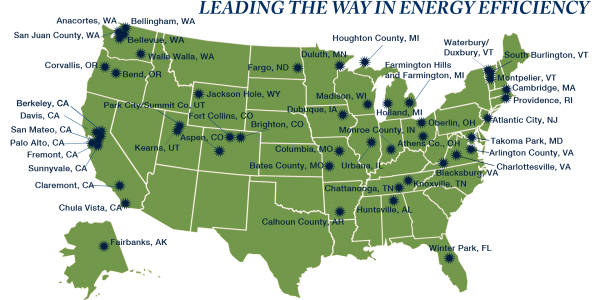Bend Ranks 11th in National Energy Reduction Competition

Bend ranks 11th among 50 communities competing for the Georgetown University Energy Prize, a national competition to reduce energy use and win a $5 million award. After a two year competition period, ending in December 2016, 10 finalist communities will be selected and then judged against six other criteria. The final winner will be announced in July of 2017.
“We are thrilled with our standing in the competition at the half way point,” said Lindsey Hardy, project director for the Bend Energy Challenge, Bend’s team in the national competition. “We have a real chance to be among the top 10 finalists and then win the competition. But if we want to win, we can’t rest—we still have a lot more work to do.”
So far, the data shows that Bend residents saved $2,904,611, plus 61,254,401 kWh of electricity, and 993,065 therms of natural gas, as well as reduced their C02 emissions by 15,451,358 kg during the first two quarters of the competition. Data for the third quarter will be released soon.
“That’s nearly $3 million that now stays in the pockets of Bend residents,” says Mike Riley, Executive Director of The Environmental Center, the organization that is leading the Bend Energy Challenge. “The other great news is that energy saving actions by Bend residents often support local businesses and employers, like home energy auditors, solar installers, and retail stores that sell efficient light bulbs and appliances.”
The energy reduction competition measures electricity and natural gas use among renters, homeowners and government buildings in 2015 and 2016. Each competing community is being compared against a baseline of how much energy it consumed in 2013 and 2014. To account for population growth, the amount of energy consumed is being divided by the total number of residential utility accounts.
In addition to measured reductions in energy use, the top 10 finalist communities will be judged on other factors such as community, youth and business engagement, replicability, and the likely sustainability of energy reductions achieved during the competition.
“Georgetown is looking for examples for other communities across the country to follow,” said Hardy. “Bend has a real chance to be a leader in energy efficiency. I’m excited to show that we’re not just a town that loves our bikes, beer, and dogs—that we’re energy savvy too.”
The Northwest Power and Conservation Council estimates that the Pacific Northwest region’s growth in demand for energy over the next 20 years could be met with energy efficiency. “Energy efficiency is a huge opportunity for not only our community but the entire Northwest,” said Riley. “We can avoid the cost and pollution of building new coal or natural gas power plants by just being smarter about how we use energy.”
The Bend Energy Challenge focuses on five key areas: low-cost, no cost actions like turning down your thermostat; switching to high efficiency LED light bulbs; getting a home energy assessment and retrofit; replacing old energy guzzling appliances with new, efficient ones; and going solar.
“Right now we’re encouraging the community to get involved by completing just one action a month. You can accomplish a lot of energy savings with little effort and time,” said Hardy. This month the Challenge is encouraging residents to change their furnace filters and start thinking about maintaining their heating systems. Furnaces with dirty filters or ducts waste energy and money, shorten furnace life, and pollute indoor air. The Challenge offers tips, resources, and coupons to get this done on their website: www.bendenergychallenge.org.
If Bend wins the competition, the $5 million prize funds would be used to help the community continue to save energy. Examples include creating low-interest loans for homeowners who invest in efficiency and solar, providing start-up funds to local businesses that innovate on energy efficiency or renewables, and funding high visibility efficiency and solar projects.
About The Bend Energy Challenge
The Bend Energy Challenge is a project of The Environmental Center, a Bend nonprofit organization that is leading the local team effort in the national Georgetown University Energy Prize competition. The Energy Challenge is a collaborative effort of local and state government, the energy utilities that serve our community, local schools, businesses and nonprofits, and statewide energy organizations. For more information, visitwww.bendenergychallenge.org or contact Lindsey Hardy at 541-385-6908 x11 orlindsey@envirocenter.org.
About Georgetown University Energy Prize
The Georgetown University Energy Prize is challenging millions of people in communities across the country to tap their imagination, creativity, and spirit of competition to become more energy efficient. After a rigorous 6-month application and filtering process, 50 communities were announced in January 2015 to compete for 2 years to be among the 10finalists selected in April 2017. The winner will be announced in the summer of 2017 withjudging based on performance, innovation, sustainability, and replicability. For more information, visit www.guep.org or call Chris Nelson, Project Director, atchristofer.nelson@georgetown.edu or 202-642-2061.